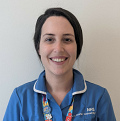Why, as a new Clinical Research Nurse, I am encouraging student nurses to follow a path into research
I am a Clinical Research Nurse based at the NIHR Manchester Clinical Research Facility (CRF), at Royal Manchester Children’s Hospital (RMCH), which is part of Manchester University NHS Foundation Trust. I have been in post here for five months, which I am very excited about, as it was my university placement here a few years ago. During my placement, I met a young boy with a rare condition who was taking part in a research study, and this experience really demonstrated the value and importance of clinical research.

Gabby Addison
How it all started
When I began my career within the health sector six years ago, I first became aware of research. I was working as a health care support worker on the Young Oncology Unit at the Christie NHS Foundation Trust, and that led me to study for my BSc degree in Children and Young people’s Nursing at The University of Salford.
As a second-year nursing student, I was naïve to the complexities and importance of research, but this attitude soon changed when I started my placement at the CRF.
I still remember my first patient. He was a three-year-old boy, with a rare and severe genetic condition known as Wolman’s disease. This metabolic disorder is characterised by a deficiency of acid lipase, an enzyme needed to break down lipid (fat) molecules. The condition typically results in a reduced life expectancy, with most children not surviving past one year.
Children with Wolman’s disease usually fail to grow at the expected rate for their age, and the disease can cause liver dysfunction or failure, which can lead to the need for an organ transplant or blood stem cell transplant. The young boy had first started attending the CRF on a weekly basis as a young baby to receive intravenous infusions of the missing enzyme, as part of the study. Without this infusion, it was unlikely he would be well enough for a transplant, so this treatment really was life-saving. As well as this, he had a gastrostomy (an external tube into his stomach) and was on an extremely low-fat diet, which was tightly controlled by the Dietetic Team. This young boy and his family stole the hearts of the staff with their courage, devotion and the family’s determination for the licencing of the treatment.
I never forgot this family, and I was fortunate enough to follow them through their journey for his cord blood transplant in October 2019 when I worked on the bone marrow transplant unit as a staff nurse (prior to beginning my current role at the CRF).
Clinical trials
Clinical trials are divided into different stages, called phases 1 to 4, to test whether they are safe and whether they work. Phase 4 trials take place after a drug is licensed. At the CRF we have trials in phases 1 to 3 and each trial has different requirements for each phase.
As a CRF team, we look after a variety of children and young people with different conditions who are taking part in clinical trials. I have quickly learnt that no two days are the same. However, every day is fulfilling and rewarding, and it’s a privilege to be involved.
The Clinical Research Nurse role
Initially, when I tell friends and family, I work within research I get the same reaction: ‘as a nurse, do you input data all day?’ – and this could not be further from the truth. I currently split my time between my team’s trials, helping the wider team on their clinic visits and learning about the ward and the vast world that is research. My day is varied, from accessing central lines, oral and intravenous (given directly into a vein using a needle or tube) medication administration, to developing professional relationships with families. I collect information to assist with data input and organise trial visits.
Training is a fundamental aspect of being a Clinical Research Nurse, in order to comprehend the complex process of a research trial and recognise the needs of patient’s conditions. Moving forward with my role, I am working towards venepuncture (the procedure of entering a vein with a needle to collect blood) and cannulation (inserting a tube to drain fluid or to give medication), as additional skills to meet the needs of the service. I will also be setting up a study for babies who are born with Pompe disease, an inherited disorder caused by the build-up of a complex sugar in the body’s cells.
I have also had the opportunity to create an information poster to promote the CRF to potential future staff. This was highly appreciated by the team and I was awarded with an excellence certificate for completing this poster to a high standard, within a small time window, in preparation for an MFT nursing recruitment event. The support from the other nurses and management at the CRF has been invaluable, and has really helped me to feel empowered to learn and succeed.
Being part of the multidisciplinary research team, and the future of medicine and treatments, gives me a sense of purpose and huge job satisfaction.
My advice to future nursing students would be, come with an open mind and get involved. You can learn so much, and this is your learning, so make the most of it. The NIHR Manchester CRF was my favourite placement for many of the reasons I’ve shared in this blog, and therefore I am proud to be here today as a qualified Clinical Research Nurse. This could be you in the next few years!




